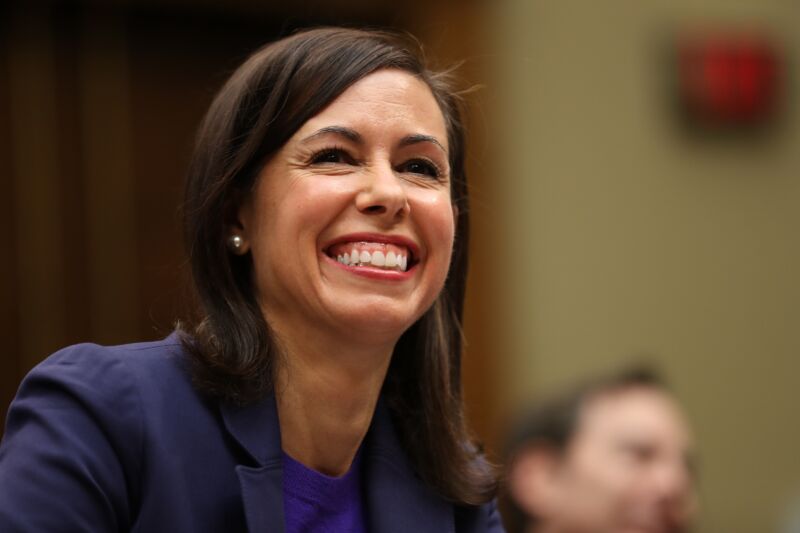
President Biden finally made his picks for the Federal Communications Commission today, ending a baffling delay that forced Democrats to operate in a 2-2 deadlock with Republicans instead of the 3-2 majority that the president’s party typically enjoys.
The names themselves are familiar. Jessica Rosenworcel, who has been acting FCC chairwoman since January, was today designated the permanent chair. Biden will also fill the empty Democratic slot on the commission by nominating Gigi Sohn, a longtime consumer advocate who was an FCC official during the Obama years. Then-FCC Chairman Tom Wheeler chose Sohn in 2013 to serve as his counselor, a role in which she advocated for strong net neutrality rules and Title II common-carrier regulation of Internet service providers.
Biden was able to promote Rosenworcel from acting to permanent chair immediately because the president can choose any sitting commissioner as chair. But Rosenworcel’s current five-year term already expired, and she would have to leave the FCC entirely in January if she doesn’t get a new term. That means Biden has to submit nominations to the Senate for both Rosenworcel and Sohn, and the Senate has to confirm them to avoid giving Republicans a 2-1 majority at the beginning of 2022.
The nominations were reported last night by Politico and The New York Times and announced by the White House today. In her nearly 10 years as an FCC commissioner, Rosenworcel “has worked to promote greater opportunity, accessibility, and affordability in our communications services in order to ensure that all Americans get a fair shot at 21st century success,” the White House said, adding:
From fighting to protect an open Internet, to ensuring broadband access for students caught in the homework gap through the FCC’s Emergency Connectivity Fund, to making sure that households struggling to afford Internet service stay connected through the Emergency Broadband Benefit program, she has been a champion for connectivity for all. She is a leader in spectrum policy, developing new ways to support wireless services from Wi-Fi to video and the Internet of Things. She has fought to combat illegal robocalls and enhance consumer protections in our telecommunications policies.
Senate confirmations often take a few months or longer, but the Rosenworcel and Sohn nominations will presumably be fast-tracked given the circumstances.
Sohn was nearly Biden’s chair pick
In 2001, Sohn co-founded consumer-advocacy group Public Knowledge, and she was president of that group until going to work for Wheeler at the FCC. Biden had reportedly floated Sohn’s name for the chair slot months ago but dropped that plan after behind-the-scenes opposition from senators. A Sohn-led FCC might have resembled the Federal Trade Commission under Lina Khan, a Biden pick who is turning the FTC into a more aggressive antitrust regulator.
“For over thirty years, Gigi has worked to defend and preserve the fundamental competition and innovation policies that have made broadband Internet access more ubiquitous, competitive, affordable, open, and protective of user privacy,” the White House said in its announcement of her nomination.
Not having Sohn as chair is probably a bit of a relief for the big telecom providers who oppose virtually every plan to regulate the broadband and cable TV industries. In July, reports of Sohn’s potential nomination led Bernstein media analyst Peter Supino to write, “As chairwoman, we think Sohn would probably pursue a form of broadband price regulation” and that, “were Sohn appointed, we would expect cable stocks to tumble.”
ISPs have generally defined “price regulation” extremely broadly—they claimed that Wheeler’s net neutrality plan was essentially rate regulation even though Wheeler never proposed limits on consumer broadband prices. But while full-blown price regulation is unlikely even in a Democratic administration, Sohn’s history as a consumer advocate suggests she might have taken more direct steps to lower broadband prices if she had become chair.
Though Rosenworcel and Wheeler usually agreed on the major telecom-regulatory questions, Rosenworcel was less enthusiastic about strict regulation than Wheeler and Sohn in one notable instance. In 2016, Rosenworcel declined to vote for Wheeler’s plan to require TV providers to make video applications for third-party set-top boxes. Wheeler wanted to make it easier for consumers to avoid paying the hardware-rental fees demanded by TV providers; the cable industry launched a major lobbying campaign against it, and Rosenworcel said that Wheeler’s plan was too complicated.
https://arstechnica.com/?p=1807563

